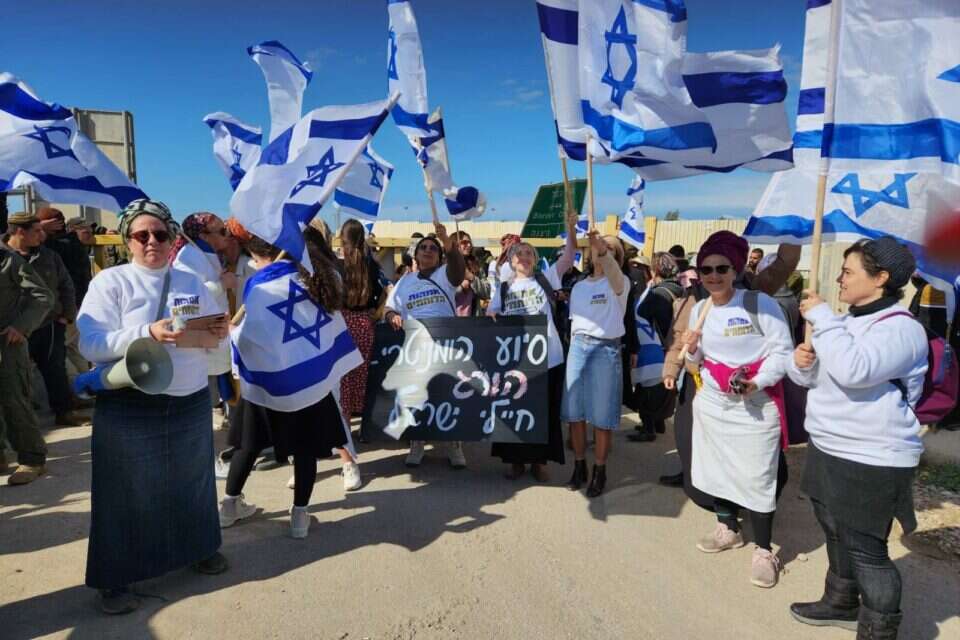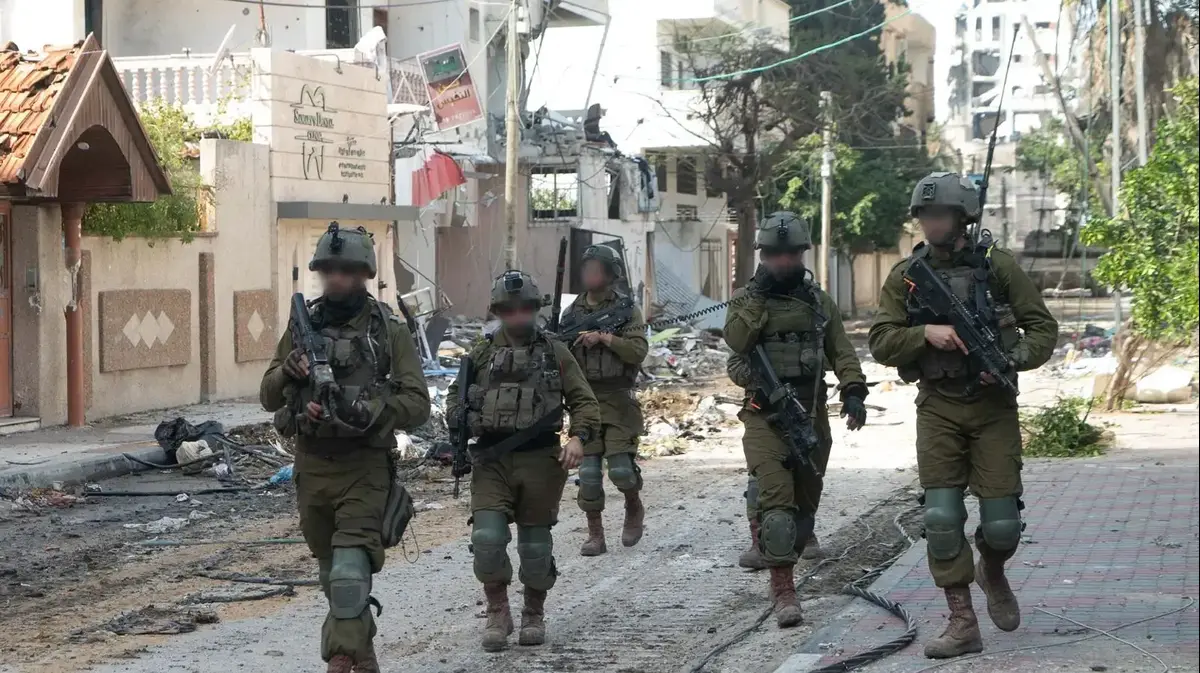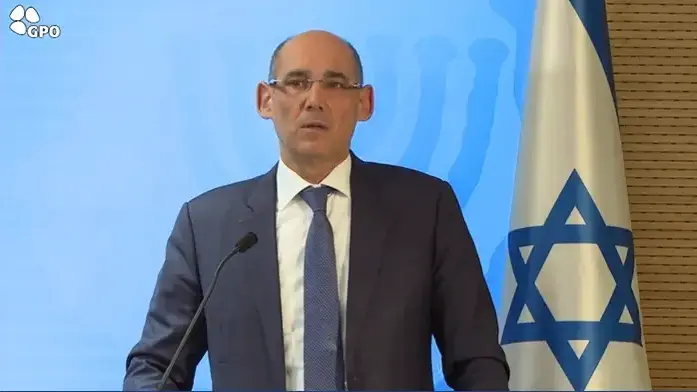MDA volunteers who come to the homes of potential patients explain how to fulfill one of the most daunting tasks these days:
Right: Hadas Finkles, Dr. Ansam al-Khatib, Colin Ben Harush and Sharon Green. "Not busy all day in fear" // Photo: Eric Sultan
They represent a combination of femininity and boldness, adherence to purpose and softness, and over the past six weeks they have fulfilled one of the most complex and daunting tasks of this time: standing at the door of a prospective patient, embroidered in white and armed jumpsuits with a test tube and nose, and taking breath and mouth samples. Only their eyes flicker beyond two masks and a big reflection, expressing compassion for them.
"We are supposed to reduce contact as much as possible so as not to be exposed to the virus for too long," says Colin Ben-Harush, who volunteers as a paramedic and ambulance driver in MDA, and also makes shifts at the new "Checked and Travel" complex in Modi'in, "A month ago I came to take a sample From a soldier who was three days with 39 degrees Fahrenheit and was in solitary confinement at his parents' home.
"I talked to the family on the phone before I went home to them. I asked them to ask everything they wanted, and apologized for having to cut as much as possible at home so as not to jeopardize myself. Basically, the patient is the one who needs to open the door so we can sample it on the spot, unless Does not allow him or he is in isolation in another room.
"The soldier was in his room, separated from the rest of the family, so his mother opened the door. She cried and begged 'Do everything so that my child does not die.' Libby went out to her. But on the other hand, I can only sample and walk, I do not give treatment.
"I felt warm in the overalls. I felt the sweat under my mask, neck, and back. It was the only time I exceeded the procedure. I stood beside her and hugged her. I explained to her that the boy was young, and his immune system was strong enough to deal with the virus. Only later did I take it from him. Sampling.
"On the way to the car, I thought about her reaction. How frightened people are of this disease, no matter what age they are. Sometimes I get really ripped from the inside, especially when you have to evacuate older people to the hospital. They cry, tremble, say they want to die now so as not to get worse. The illness and the condition that they might be breathing in. I hide my tears. I don't want them to see me cry with them. "
These are the beautiful faces of MDA. Colin (40) from Beit Dagan; Dr. Ansam al-Khatib (35) from the Tzur neighborhood of East Jerusalem, who works as a dentist and volunteer as the only Arab ambulance driver in Jerusalem; Hadas Finkles, 33, of Herzliya, wearing emergency medicine and driving an ambulance; And Sharon Green, 49, of Coastal, wearing emergency medicine, an ambulance driver, and also a driver in MDA's motorcycle unit. They are four of about 200 women who serve as models in homes and "check-in and travel" parking lots.
Colin, a divorced, is an 18-year-old mother and two-year-old, whom she chose to bring into the world from sperm donation. Of the four, she is the oldest in MDA, and has been a volunteer for 12 years.
"As a child, I knew I wanted to do something therapeutic," she says, her green eyes radiating, "but life led me to other places. I worked as a court typist when one of my neighbors in the building suffered a cardiac arrest in his home. I heard the commotion and went outside, but I didn't know how to help him .
"Following this case, I decided to volunteer for MDA. I turned volunteering into a profession, and until recently I worked for a private company, which provided first aid training for companies in the economy, including the Ministry of Defense and the Ministry of Transport. At the beginning of the Corona crisis, I was fired, so today I only volunteer in MDA and live off the savings. "
Ansam, a single woman living with her parents, has dedicated her life to the medical world. She studied dentistry at al-Quds University in East Jerusalem. She initially worked in a private clinic in the east of the city, while studying for a master's degree in public health and community medicine, and then issued a teaching certificate in special education. She also works as director of the Arab Renaissance Academic Technology Center, which encourages women to leave for work.
For the past six months, she has been working as a dentist at Yad Sarah Organizing and moving around Jerusalem with a mobile clinic to provide care for the elderly and disabled. MDA volunteered about three years ago.
What reactions did you experience while driving an ambulance?
"In the Arab sector, it was difficult for me at first, because you see a religious Muslim woman driving, and more for an Israeli body. Over time, they have become accustomed to it, even though it is not acceptable to us. I see reactions from ultra-Orthodox Jews, and I often come with a medic so they will not feel I admit that sometimes the looks are unpleasant, but I ignore it, even though it requires a mental effort. I have to stay strong and do what I believe in.
"MDA supports and allows me breaks in prayer times. I have to say that at no point have I encountered any revelations of violence or insulting comments because people know I'm here to help. Some respond in a funny way. Last week, for example, I was at the traffic light with the ambulance, and a young guy on a motorcycle saw me like that, with his headscarf, and decided it was cool, so he took out the phone and took a selfie while I'm in the background. "
How did you respond?
"It was very embarrassing," she says, and her honey looks shameful.
Hadas, who is in a relationship with a 57-year-old partner, joined MDA two and a half years ago, after years of working as a surfing instructor in Herzliya and Tel Aviv. As befits anyone who until the close, she spent her free time between the waves, her sunburnt hair and tanned skin.
"I've been at sea since I was a baby," she smiles, "I thought I would go surfing until I was older, but three years ago one of the surfers at the club where I worked in Herzliya drowned and something changed for me. I saw the other surfers screaming at him and dragging him to the beach. To this day, what happened to him, and if he got hit from the surfboard, all I could do at that moment was call 101 and call an ambulance.
"This event greatly affected me. I realized that if I continued to spend so many hours in the water, I would not try anything else. In those days, my grandmother was in a rehabilitation institution, and I saw ads calling for volunteering in MDA. I decided that was what I wanted to do in life. Make a full conversion. In advance, I wanted to join as a full-time employee and not as a volunteer. Since then, all CPR and rescue are satisfying. "
In Sharon, divorced with three children (21, 18 and 16), the professional retraining came after a crisis in her life. She was fired from her job as a product designer, after years of designing Disney furniture, shoes and baby products.
"I immediately found a new job in the field, got a decent salary and travel abroad, but I felt it was no longer for me. I didn't know what I wanted, but I knew what I didn't want. I'm tired of dealing with materialism and commercialism and sitting in the office all day. I was looking to give something to the company, get out, be on the move. Breathe.
"One day three years ago, when I was in traffic on the coastal road, and as usual, driving to work crying because I felt I was in the wrong place, an ambulance with a siren bypassed me. I followed it with my eyes, and then I suddenly said to myself: This is what I want to do.
"At first, I went through a paramedics course and volunteered, and after six months became my job. When I realized that being a motorcycle volunteer can also be an emergency response in my area of residence, I obviously joined in as well. I missed the two-wheeler. On a 500 cc motorcycle, and I'm missing it. Since then I just want to advance in MDA. I even recently went to a paramedics course, which was discontinued because of the situation. "
When they meet the four together at MDA's National Rescue Center in Kiryat Ono, they seem to have the opportunity to share experiences, and in particular to release some steam. Stomach examines the structure that was placed in the parking lot for quick corona testing, and estimates placed inside white styrofoam boxes. And do not complain even when the photos are taken under the blazing sun and last for many minutes, and for any event where there is a suspicion of Corona they will come out protected in the same way.
First they lock the thighs, which reach to the knees. Then put on the jumpsuit and put on the hood so that no hair is cut, and close the zipper. Then they wear two layers of gloves, cover the face and nose with a surgical mask, over which the N95 facility mask, and finally cover the entire face area with a large reflector.
They made the decision to serve as examples of corona testing without any hesitation. Colin knew she was leaving two children alone at home, and trusted her parents to come help. "Every day, I work at an MDA station in Rishon Lezion, and I come across as a volunteer for the job," she says, as she takes off her overalls and packs it in a bag to use for practice for other medics.
"The thought that I might get infected didn't even come to mind. I took a course in Tel Aviv, teaching us all how to sample, how to defend and how to undress from the protector without contaminating the uniform underneath. To our delight, so far no Corona model has been infected. The only four MDA employees The virus infected the community at first, before deciding on social remoteness or closure. "
You have decided to risk yourself, although there are close people you can catch up with.
Colin, who until then was the giggly and energetic of the group, stops smiling. Her eyes fill with tears running down her cheeks. She pulls the phone out of her pocket and shows a picture of a toddler with huge cookies and azure eyes, which looks remarkably like her.
"This is a girl who came 16 years after the son, and I very much wanted her, even though I didn't have a partner. But I have to say that despite the fear of catching up with them, and although I was left without work, the common good was before my eyes. Take care of the children. "
Ansam looks at her from the side, and her eyes tear as well. "I have no children, but I am very attached to my six-month-old nephew, who lives with my brother under my parents' house. Last week, after a long shift, I returned home, and he saw me and immediately sent me hands to leave him. But I shouldn't. I saw in his eyes that he didn't understand why I didn't hug him as usual, he cried, and so did I.
"Every morning, before I go to work or volunteer, I hug my parents. Ever since I started sampling Corona, I stopped with the hug, today it is forbidden anyway. I just ask them to pray for me. That is how they are very worried.
"My little brother, Nasim, 23, also volunteers at MDA. Last week, he reached a hundred gates with a municipal patrol car, and threw stones at them. He is the medic he wrote about in the media wounding his head. "
For Sharon, dealing with the children who are at home is different. They seem to care about her.
"With the bouncing regularly, there is no great difficulty, because I get on the motorcycle, give a first response, and when the ambulance arrives I retire. My big son has been released from the IDF and for the past six months worked in Australia as a gas station manager. The high school girls are great.
"When I suggested last month to work on the Corona tests, I shared with the kids. I told them we were at war, and MDA on the front. The son was fine with that, but the girls were a little angry. They feared something might happen to me, and that I might endanger them too. They even said I was not responsible. I explained that it is much safer to come to a patient who is suspected in Corona than to a regular patient, because we come well-protected.
"I don't think we're brave or special. All the credit comes to our families, who sacrifice to continue our mission. Ironically, my son returned from Australia last week, after being fired from work, and now in solitary confinement, with friends. him".
Colin says she revealed to her son what she was dealing with just three weeks ago, to spare him the anxiety. "Like a lot of kids his age, he asked some questions, and when he became convinced that I was defending myself, he told me it was cool."
Hadas has no children yet. "I have a partner who is almost a risk population, does that count?", She laughs. "As soon as I started sampling, he walked away from me and stopped meeting me because he had a problem with it. After two weeks he got used and we got back together."
People move away then?
Sharon: "No one is moving away from me, on the contrary. I have become a kind of focus on Corona. Neighbors are communicating with questions and to consult."
Ansame: "Sometimes I think the neighbors are a little apprehensive, but it is enough for me that my parents accept what I do and know that I am responsible."
Hadas: "Since working as a model, my friends refuse to meet with me. Sometimes I feel quite isolated. After a shift, I stop by the sea, look a little at the waves, relax and go home."
In recent weeks, they have sampled hundreds of people. Every shift is given a tidy list, except for emergencies, which require immediate evacuation to the hospital. Even if they pop up due to an accident, birth, cardiac event or any other reason, they make sure they are not a person who has been in contact with a patient or someone who has returned from abroad. In any case, they are wearing masks and gloves, and wearing masks for patients as well.
Colin recalls the first time she arrived to take samples for a corona test. "I was among the first in the country to sample people. I went alone to the apartment in Rishon Lezion with an MDA vehicle, designed for sampling. It was a ten minute drive. I thought in a way what the risk was to myself, and what would happen if I made a mistake and put the dummy too deep, which would not cause a vomiting reflex.
"When I arrived, HaMoked raised the patient for a conference call over the phone. It was a 76-year-old woman who had returned from abroad. I took her personal details from her and asked her to ask me any questions, before going up to her. When I got out of the car I looked for a place to defend. It was noon, and I didn't want to panic among the people on the street. I walked into the lobby of the building, made sure no one was there, and put on my overalls, gloves and masks. I went up the stairs to the second floor, and in front of the door I made the yellow bag, to which the jumpsuit and protective means were later thrown.
"The woman opened to me, and she was very scared and pale. She had a high fever. I was a little stressed, my hands were shaking. We didn't have dialogue, we made sure the samples would speak as little as possible, so that the saliva was not flying towards us. She was disciplined, I felt frozen. .
"When I came out, I was lightly frightened. Although we were doing dozens of exercises, I feared I would not prisoner properly protect it. I dropped everything carefully, put it in a bag and sealed it. I threw it in the car's luggage and drove away. I felt satisfied, and smiled to myself. "When I got home, I felt I was already skilled. The kids were already asleep, and I avoided going into their room. I went into the shower right away."
Ansam also recalls the first time she went to take a sample. Since her younger brother was also on duty, they decided to travel by ambulance together.
"It was in Kiryat Yovel," she smiles. “We came to the apartment where six students who had returned from overseas lived, and talked to them from the vehicle downstairs. I didn't understand why they were together, because if one got sick he would catch up with the rest. My brother and I were lounging in the lobby of the building, and we walked up to them. Naturally, I was excited. When we got back to the ambulance, I breathed wide and thought that everything was behind me.
"Suddenly I saw that one of them was running after us, and he had a pot in his hand. He asked us to stop and squeeze a little, because we were no longer protected, and the overalls were in a bag that was going to be destroyed. We made sure to stand from a distance and asked what he wanted, and he asked us to take the pot with us. Infected with corona.
"I told him we were from MDA, that we came to take samples, and we were not responsible for garbage disposal. I pointed to a tin and told him to throw it. "
The first time Heads came in contact with Corona patient about a month ago was completely different. She was in the middle of a shift at MDA station in Petah Tikva, when the call came for a patient to be hospitalized in Corona who was staying at home. "He was in isolation and his condition deteriorated," she says. "I was driving in the ambulance when I was fully armed, with the white overalls. I was alone, before that I had volunteer boys with me, and they are not allowed to treat Corona patients.
"The patient, about 60, sat back and talked to me a little bit. He was calm, managed to walk on his own, and didn't understand why I was so depressed. I couldn't talk to him too much because I concentrated on driving. Even so, he barely heard me because of the mask on the mouth.
"When I dropped him off at Tel Hashomer, I didn't immediately remove the suit. I made a selfie and sent friends. Only then did I take off my overalls and disinfect the phone."
When chatting with each other in the parking lot of the MDA hotline, they keep a close eye on each other, but give up the masks that they wear most of the day.
Don't you worry about getting infected?
Colin: "There is always concern, but we are protected. If all day long I am in fear, I will not be able to do what I need to do. We do a lot of refreshing, and we always make sure we are adept at wearing and removing the shield. The truth - I believe that after such a period We have long developed some immunity.
"Basically, I try to check on Corona every week, probably since I've been in Intelligence and Checked. So far there has been no sign of the virus."
Ansam: "I believe my body is strong and my immune system is working properly. Besides, I trust MDA that the protection they provide is adequate."
Sharon: "After so many years with patients, some with infectious diseases such as tuberculosis, I believe my body is learning to defend and develop a more durable immune system. It's not that we breathe the corona in an open face. Even if, God forbid, I guess the symptoms will be mild ".
Hadas: "At first, I was not worried. But a week after I started sampling, I got very sick, with all the symptoms of the corona. I was sure I was infected, and I was afraid of infecting people from the station. I was not afraid of myself because I was young and without background illness. I did a test, and it came out negative .
"I have not been tested since, but when you see that there are also young people who are ill and in serious condition, I no longer take the age issue lightly."
How do the people you come to test respond to?
Hadas: "Sometimes, after I walk out of the building, I see that the people I sampled look at me from the windows. You can understand them. Suddenly there is a kind of white smurf in front of them, that they can see only his eyes. It's nice that they want to see who is hiding behind the mask."
Colin: "Occasionally I offer food or drink, out of gratitude, but I don't take it. It seems unethical to me, and there is also the fear that something may be infected. Once they offered me money, so I would buy myself food. I thanked them and made it clear to me".
Sharon: "It goes without saying that coming back from abroad and going into isolation offered to give me sweets. She took me a big, sealed bag from Duty Free and asked me to take it to the station. I preferred not to take. "
Hadas: "I have neighbors, who occasionally bring cakes to take to the other paramedics at the station. I take and bring them, because it shows that the public appreciates our work."
tala@israelhayom.co.il









